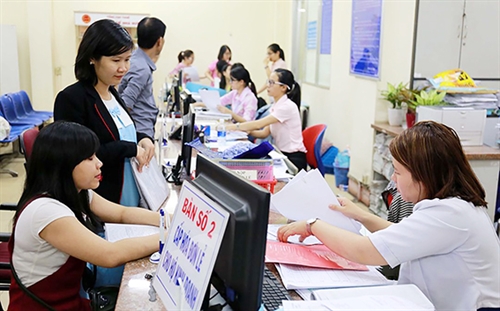The Ministry of Finance (MOF) is working on two draft legal documents on tax administration, aiming to close current loopholes in the tax systems, especially those related to collection of tax on e-commerce and digital platform-based trading activities.
 |
| Carrying out tax procedures at the Tax Branch of District 1, Ho Chi Minh City__Photo: thanhnien.vn |
The first document is a draft circular guiding tax administration of business households and individuals in which the MOF proposes a very noteworthy provision requiring intermediary institutions such as e-commerce platforms and shipping and delivery service providers to declare information and even pay tax on behalf of online goods and service sellers. However, such provision would not apply to foreign service providers.
As for individuals selling goods or services via social networks like Facebook or Instagram, local tax offices would exploit data published on personal profiles or business pages to identify sellers and on that basis, seek appropriate methods to collect taxes from them.
The draft circular also renews tax administration methods applicable to large-scale business households, i.e., business households earning a turnover of VND 3 billion or more, for those engaged in trade in goods or services, or VND 10 billion or more, for those operating in the production sector. Under current regulations, presumptive taxation is applied to all business households, regardless of their sizes. However, many business households have taken advantage of this method to sell invoices to others or provide lawful invoices for smuggled goods. To fix this loophole, the MOF suggested that large-scale business households would have to declare and pay tax based on their account books.
The second document is also a draft circular which guides the Law on Tax Administration and its detailing text, Government Decree 126 of 2020, focusing mainly on tax administration of e-commerce and digital platform-based business activities of overseas suppliers without fixed business establishments in Vietnam.
Accordingly, organizations and individuals obliged to make tax registration, declaration and payment for e-commerce and digital platform-based business activities include: (i) overseas suppliers without fixed business establishments in Vietnam but engaged in e-commerce and digital platform-based business activities with Vietnam-based organizations and individuals; (ii) Vietnam-based organizations and individuals purchasing goods or services from overseas suppliers; organizations and tax agents authorized by overseas suppliers to make tax registration, declaration and payment in Vietnam; and (iii) commercial banks, payment intermediary service providers and organizations and individuals related to e-commerce and digital platform-based business activities of overseas suppliers.
Overseas suppliers would make registration to conduct tax transactions online via the portal of the General Department of Taxation (GDT). They would be required to register only one official email address to receive notices from their managing tax offices but allowed to register several bank accounts serving tax payment.
Overseas suppliers may either declare tax by themselves via the GDT’s portal or authorize tax agents operating under Vietnam’s law to perform such job on their behalf.
In case overseas suppliers fail to register, declare and pay taxes on the goods/services they have sold to Vietnam-based customers, either the buyers, for institutional customers operating under Vietnam’s law, or commercial banks or intermediary payment service providers, for individual customers, would declare, deduct and pay taxes on the former’s behalf.
The GDT would work with related agencies to identify and make public the names and website addresses of overseas suppliers not yet made tax registration, declaration and payment.- (VLLF)









